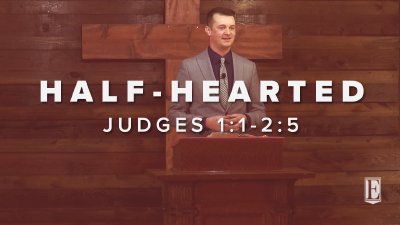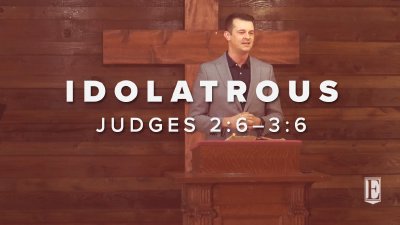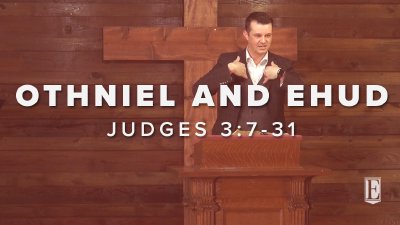OUTLINE
I. Our unfaithfulness brings reproach upon the name of the LORD (v.23-27)
II. For the sake of His name, the LORD overrules our unfaithfulness and causes us to glorify Him again (v.28-31)
III. Samson is never more reminiscent of Jesus than in his death
DISCUSSION
1. Read verses 23-24. Why do the Philistines gather? Who did they sacrifice to? Why did they worship Dagon here? How does the LORD humiliate the idol Dagon and his worshipers in 1 Samuel 5:1-5?
2. Read verses 25-27. Why did the Philistines bring Samson out in the midst of their rejoicing? How many Philistines, and of what kind, were present? What does Samson do when he is brought out and how does this further show his cunning?
3. Read verse 28. What did Samson ask of the LORD? Why did he ask this? Do you think this was the right motivation—how does Deuteronomy 32:35-36 shed light on the answer? What would have been the right motivation?
4. Read verses 29-31. What did Samson do after he was placed by the pillars? In what way is Samson like Jesus? In what ways is he different? What can we learn from the life and death of Samson?

SAMSON (pt.5): Judges 16:23-31
Judges 16:23-31
April 19, 2020 • Brett Baggett
HALF-HEARTED: Judges 1:1–2:5
January 12, 2020 • Brett Baggett
DISCUSSION 1. Read Judges 1 verses 1-7. What do we learn about the period of history in which this book is set, according to verse 1? How does this differ from Joshua chapter 1, which followed the death of Moses? Who did the LORD tell to go up against the Canaanites and who actually went? How does Adoni-bezek respond once they “caught him and cut off his thumbs and his big toes”? What can we learn from all of this? 2. Read verses 8-15. How does Joshua 15:13-19 help tie the book of Joshua and the book of Judges together? How does 1 Samuel 18:25 help us understand what is happening here with Caleb, Achsah, and Othniel? What else stands out to you and why? 3. Read verses 16-36. What had the LORD commanded his people to do in Joshua 6:17 and 11:14? How do these verses help us see the half-hearted obedience of the LORD’S people? 4. Read chapter 2 verses 1-5. Who is “the angel of the LORD” and how can we tell? What did he do? What did he promise? What did he command? What did the people do in response? What did the LORD do in response to their disobedience? How did the people respond to the LORD’S discipline? How does Hebrews 12:3-17 help clarify?
IDOLATROUS: Judges 2:6-3:6
January 19, 2020 • Brett Baggett
DISCUSSION 1. Read verses 6-10. What marked the people of God during the time that Joshua and his fellow elders lived? What happened after the generation of Joshua? How should this sober us as we teach the next generation and make disciples in our day? 2. Read verses 11-15. What are some of the words used to describe what the people of Israel did after the death of Joshua and his generation? What are some of the words used to describe the LORD’S response to their apostasy? *apostasy: “abandonment of former faith.”What is the state of the people of Israel as described in verse 15? How do we see the sovereignty of God in these verses as opposed to a naturalistic view of history? 3. Read verses 16-23. These verses serve as a summary of the entire book of Judges. What did the LORD do in response to the “terrible distress” of the people? What did the people do in response to the LORD sending them Judges to save them? What else stands out to you in these verses and why? 4. Read chapter 3 verses 1-6. Why did the LORD leave the other nations among the people of Israel according to verse 2? Why did the LORD leave the other nations among the people of Israel according to verse 4? Is testing the same thing as tempting? How do James 1:13 and 1 Peter 4:12-13 help clarify?
OTHNIEL AND EHUD: Judges 3:7-31
January 26, 2020 • Brett Baggett
DISCUSSION 1. Read verses 7-11. What does the writer mean when he says “they forgot the LORD”? What do we learn about salvation and God’s grace in this passage? 2. Read verses 12-14. What did the people of Israel do? What did the LORD do in response? 3. Read verses 15-30. What is the significance of Ehud being left-handed (verse 15)? What stands out to you in this passage and why? What should we learn from these verses? 4. Read verse 31. What light does the ESV Study Bible note on Judges 3:31 shed on the identity of Shamgar?







